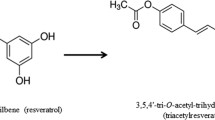Abstract
Objective
Resveratrol is an edible polyphenolic phytoalexin present in different plant species and plays important role in inhibiting proliferation and inducing apoptosis of pancreatic cancer cells. In this paper, the mechanism of resveratrol on PANC-1, CFPAC-1 and MIA Paca-2 cells apoptosis was examined.
Methods
We first evaluated the effect of resveratrol on viability of PANC-1, CFPAC-1 and MIA Paca-2 cells using MTT assay. Next, we performed real-time PCR to assess the effect of resveratrol on miR-21 expression. We also used Western blot to measure BCL-2 protein levels after down-regulation of miR-21 expression. Finally, we evaluated the effect of miR-21 on resveratrol-induced anti-tumor activity using miR-21 mimic.
Results
Resveratrol induced a significant inhibition of PANC-1, CFPAC-1 and MIA Paca-2 cells viability in a dose-dependent manner. Resveratrol also decreased the expression of miR-21. Besides, down-regulation of miR-21 expression can inhibit BCL-2 expression in PANC-1, CFPAC-1 and MIA Paca-2 cells. Over-expression of miR-21 expression can reverse down-regulation of BCL-2 expression and apoptosis induced by resveratrol.
Conclusions
In this study, we demonstrated that the effect of resveratrol on apoptosis is due to inhibiting miR-21 regulation of BCL-2 expression.




Similar content being viewed by others
References
Kindler HL (2005) Front-line therapy of advanced pancreatic cancer. Semin Oncol 32:S33–S36
Harikumar KB, Aggarwal BB (2008) Resveratrol: a multitargeted agent for age-associated chronic diseases. Cell Cycle 7:1020–1035
Borriello A, Cucciolla V, Della Raqione F, Galletti P (2010) Dietary polyphenols: focus on resveratrol, a promising agent in the prevention of cardiovascular diseases and control of glucose homeostasis. Nutr Metab Cardiovasc Dis 20:618–625
Albani D, Polito L, Forloni G (2010) Sirtuins as novel targets for Alzheimer’s disease and other neurodegenerative disorders: experimental and genetic evidence. J Alzheimers Dis 19:11–26
Roy SK, Chen Q, Fu J, Shankar S, Srivastava RK (2011) Resveratrol inhibits growth of orthotopic pancreatic tumors through activation of FOXO transcription factors. PLoS One 6(9):e25166
Zhou JH, Cheng HY, Yu ZQ, He DW, Pan Z, Yang DT (2011) Resveratrol induces apoptosis in pancreatic cancer cells. Chin Med J (Engl) 124(11):1695–1699
Bartel DP (2004) MicroRNAs: genomics, biogenesis, mechanism, and function. Cell 116:281–297
Winter J, Jung S, Keller S, Gregory RI, Diederich S (2009) Many roads to maturity: microRNA biogenesis pathways and their regulation. Nat Cell Biol 11(3):228–234
Tili E, Michaille JJ, Alder H, Volinia S, Delmas D, Latruffe N, Croce CM (2010) Resveratrol modulates the levels of microRNAs targeting genes encoding tumor-suppressors and effectors of TGFβ signaling pathway in SW480 cells. Biochem Pharmacol 80(12):2057–2065
Link A, Becker V, Goel A, Wex T, Malfertheiner P (2012) Feasibility of fecal MicroRNAs as novel biomarkers for pancreatic cancer. PLoS One 7(8):e42933
Pietenpol JA, Paradopoulos N, Markowitz S, Willson JK, Kinzler KW, Vogelstein B (1994) Paradoxival inhibition of solid tumor cell growth by bcl2. Cancer Res 54(14):3714–3717
Rückert F, Samm N, Lehner AK, Saeger HD, Grützmann R, Pilarsky C (2010) Simultaneous gene silencing of Bcl-2, XIAP and Survivin re-sensitizes pancreatic cancer cells towards apoptosis. BMC Cancer 10:379
Dong J, Zhao YP, Zhou L, Zhang TP, Chen G (2011) Bcl-2 upregulation induced by miR-21 via a direct interaction is associated with apoptosis and chemoresistance in MIA PaCa-2 pancreatic cancer cells. Arch Med Res 42(1):8–14
Li J, Wang Y, Yu X, Chen H, Wu Y, Han X, Guo X, Zhang C, Chen Q, Chen J, Yang T (2009) Islet neogenesis-associated protein-related pentadeca peptide enhances the differentiation of islet-like clusters from human pancreatic duct cells. Peptides 30:2242–2249
Ma T, Zhu ZG, Ji YB et al (2004) Correlation of thymidylate synthase, thymidine phosphorylase and dihydropyrimidine dehydrogenase with sensitivity of gastrointestinal cancer cells to 5-fluorouracil and 5-fluoro-2¢-deoxyuridine. World J Gastroenterol 10:172–176
Vermes I, Haanen C, Reutelingsperger C (2000) Flow cytometry of apoptotic cell death. J Immunol Methods 243:167–190
Jang M, Cai L, Udeani GO, Slowing KV, Thomas CF, Beecher CW, Fong HH, Farnsworth NR, Kinghorn AD, Mehta RG, Moon RC, Pezzuto JM (1997) Cancer chemopreventive activity of resveratrol, a natural product derived from grapes. Science 275(5297):218–220
Mo W, Xu X, Xu L, Wang F, Ke A, Wang X, Guo C (2011) Resveratrol inhibits proliferation and induces apoptosis through the hedgehog signaling pathway in pancreatic cancer cell. Pancreatology 11(6):601–609
Baur JA, Sinclair DA (2006) Therapeutic potential of resveratrol: the in vivo evidence. Nat Rev Drug Discov 5(6):493–506
O’Connell RM, Rao DS, Chaudhuri AA, Baltimore D (2010) Physiological and pathological roles for microRNAs in the immune system. Nat Rev Immunol 10(2):111–122
Buscaglia LE, Li Y (2011) Apoptosis and the target genes of microRNA-21. Chin J Cancer 30(6):371–380
Shi L, Chen J, Yang J, Pan T, Zhang S, Wang Z (2010) MiR-21 protected human glioblastoma U87MG cells from chemotherapeutic drug temozolomide induced apoptosis by decreasing Bax/Bcl-2 ratio and caspase-3 activity. Brain Res 1352:255–264
Conflict of interest
None.
Author information
Authors and Affiliations
Corresponding author
Rights and permissions
About this article
Cite this article
Liu, P., Liang, H., Xia, Q. et al. Resveratrol induces apoptosis of pancreatic cancers cells by inhibiting miR-21 regulation of BCL-2 expression. Clin Transl Oncol 15, 741–746 (2013). https://doi.org/10.1007/s12094-012-0999-4
Received:
Accepted:
Published:
Issue Date:
DOI: https://doi.org/10.1007/s12094-012-0999-4




